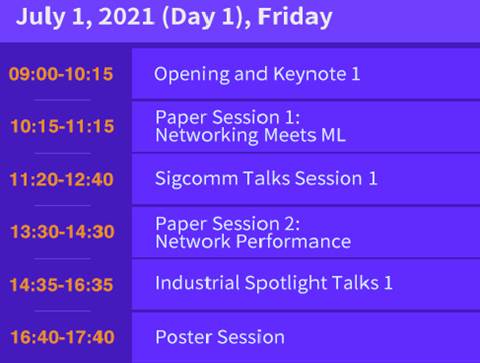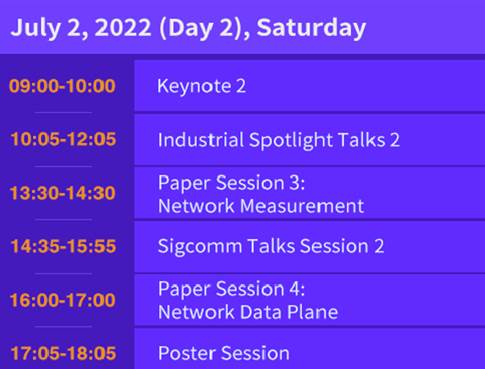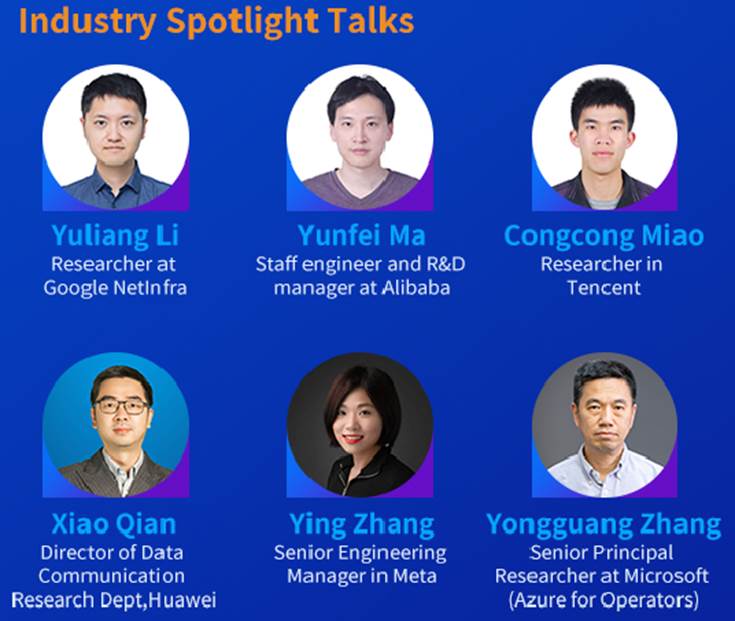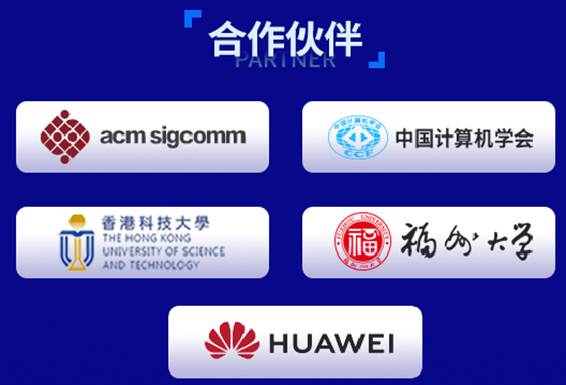第六届亚太网络研讨会(APNet2022)
由bat365官网登录入口陈国龙教授和国防科大苏金树教授担任共同主席、ACM SIGCOMM、CCF互联网专委会和bat365官网登录入口等单位联合举办的第六届亚太网络研讨会(APNet2022)定于2022年7月1日-7月2日在线召开。本会议旨在将亚太地区计算机网络和系统领域最优秀的研究人员聚集在一起,探讨网络研究热点,同步学术界和工业界最新研究成果,激发创新想法。APNet的一个重要目标是让有希望但尚未成熟的想法得到领域内资深研究人员的及时反馈和建议,帮助他们在SIGCOMM、NSDI、MobiCom等顶级学术会议上发表论文。
APNet 2022亚太网络研讨会,将包括2大主题演讲、20多篇论文报告、6场工业界技术展望、以及8位SIGCOMM/NSDI作者的经验分享,大咖云集,干货满满,请大家踊跃报名参会!
参会人员免费注册地址:(会前均可注册)
https://conferences.sigcomm.org/events/apnet2022/registration.html (Web网站注册)
或 https://wj.qq.com/s2/10407222/9b54/ (手机端直接注册)
注册用户可以通过Zoom/Youtube/Bilibili参会,Zoom主会场可以容纳300人,可以参与现场问答和讨论,Youtube/Bilibili是直播,无法参与讨论环节。
Zoom主会地址:
https://hkust.zoom.us/j/3666130280?pwd=SE1yN1lJRG51MERsYXo3Ym5oMTJ5QT09
B站转播地址:
http://live.bilibili.com/25199665
会议日程表


详细会议日程信息见官方网站:
https://conferences.sigcomm.org/events/apnet2022/program.html
邀请嘉宾简介:
Keynote Talks 1:

Abstract: AI/ML models have risen to prominence in part because of their ability to derive answers (from data) to problems that were previously inaccessible. This is true for networks, for which AI/ML models have been applied to problems ranging from congestion control, anomaly detection, performance monitoring, etc. There is, however, another equally interesting and important aspect of AI/ML models in relation to networks, namely, their role as users of networks. Just as much as traditional applications such as, say, voice or video, have both been shaped by their use of networks and contributed to how networks have evolved, the same applies to AI/ML systems. In particular, AI/ML systems and networks are engaged in a complex yet productive interplay, where each contribute to the other. Networks affect the design and structure of AI/ML systems as well as their operation, and conversely AI/ML systems often provides effective solutions to the networking problems to which this gives rise. I will offer a brief overview of key dimensions of this relationship before focusing on two examples, both involving an object classification AI/ML system, to illustrate more concretely the dynamics of those interactions.
Speaker Bio: Roch Guérin is the Harold B. and Adelaide G. Welge Professor and Chair of Computer Science and Engineering at Washington University in Saint Louis, which he joined in 2013. He previously was the Alfred Fitler Moore Professor of Telecommunications Networks in the Electrical and System Engineering department of the University of Pennsylvania, which he joined in October 1998. Prior to joining Penn, he spent 12 years at the IBM T. J. Watson Research Center in a variety of technical and management positions. He was on leave from Penn between 2001 and 2004, starting Ipsum Networks, a company that pioneered the concept of route analytics for managing IP networks. Roch received his Ph.D. from Caltech and did his undergraduate at ENST in France. He is an ACM and IEEE Fellow. He served as the Editor-in-Chief for the IEEE/ACM Transactions on Networking and as the Chair of ACM SIGCOMM. In 1994 he received an IBM Outstanding Innovation Award for his work on traffic management. He received the IEEE TCCC Outstanding Service Award in 2009 and was the recipient of the 2010 INFOCOM Achievement Award for “Pioneering Contributions to the Theory and Practice of QoS in Networks.”
Keynote Talks 2:

Abstract: Serverless computing platforms simplify development, deployment, and automated management of modular software functions, while promising efficient, low-cost compute capability for users. Edge clouds bring the cloud ‘closer’ to the users and sources of data, such as sensors, and can be very useful to meet the low latency requirements of many Internet-of-Things (IoT) applications. However, existing serverless platforms typically assume an over-provisioned cloud, making their designs not ideally suited for edge clouds where resources may not be as plentiful. We have been developing enhancements of Knative to comprehensively tackle the key challenges for supporting serverless functions in a resource constrained edge cloud. First, our Mu platform cleanly integrates the core resource management components of a serverless platform: An autoscaler that anticipates workload fluctuations to proactively meet SLOs, by leveraging piggybacked metrics from individual function pods; a placement engine that accounts for heterogeneity and fairness across competing functions; and a load balancer that seeks to better route requests based on current state information. There are also a number of other challenges with existing serverless solutions, such as Knative. These include the overhead of heavyweight components such as sidecar proxies for managing the overall system, and software protocol adaptors. We have created a novel, event-driven proxy based on the extended Berkeley Packet Filter (eBPF), to replace the regular heavyweight Knative ‘queue proxy’. Further, serverless platforms lack dataplane optimizations to achieve efficient, high-performance function chains that facilitate the popular microservice development paradigm. We exploit event-driven shared memory processing to dramatically improve dataplane scalability and avoid unnecessary protocol processing and serialization-deserialization overheads. Overall, we achieve an order of magnitude improvement in throughput and latency compared to Knative, while substantially reducing CPU usage, and mitigating the need for `cold-start'.
Speaker Bio: Dr. K. K. Ramakrishnan is a Distinguished Professor of Computer Science and Engineering at the University of California, Riverside. Previously, he was a Distinguished Member of Technical Staff at AT&T Labs-Research. He joined AT&T Bell Labs in 1994 and was with AT&T Labs-Research since its inception in 1996. Prior to 1994, he was a Technical Director and Consulting Engineer in Networking at Digital Equipment Corporation. Between 2000 and 2002, he was at TeraOptic Networks, Inc., as Founder and Vice President. Dr. Ramakrishnan is an ACM Fellow, IEEE Fellow and an AT&T Fellow, recognized for his fundamental contributions on communication networks, congestion control, traffic management, VPN services, and a lasting impact on AT&T and the industry. His work on the "DECbit" congestion avoidance protocol received the ACM Sigcomm Test of Time Paper Award in 2006. He has published over 300 papers and has 186 patents issued in his name. K.K. has been on the editorial board of several journals and has served as the TPC Chair and General Chair for several networking conferences. K. K. received his MTech from the Indian Institute of Science (1978), MS (1981) and Ph.D. (1983) in Computer Science from the University of Maryland, College Park, USA.


更多会议信息请见APNet2022官方网站:
https://conferences.sigcomm.org/events/apnet2022/index.html
